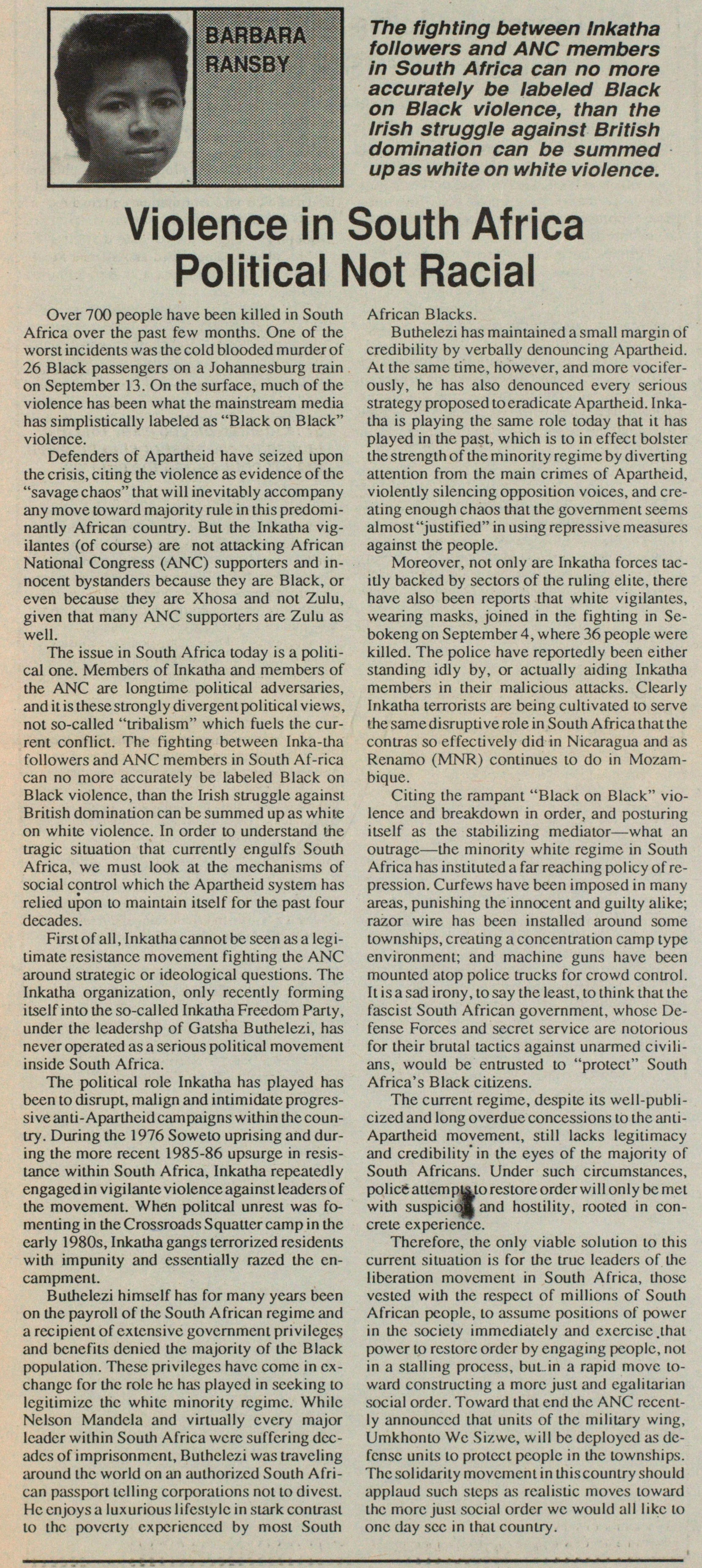Violence In South Africa Political Not Racial

Over 700 people have been killed in South Africa over the past few months. One of the worst incidents was the cold blooded murder of 26 Black passengers on a Johannesburg train on September 13. On the surface, much of the violence has been what the mainstream media has simplistically labeled as "Black on Black" violence.
Defenders of Apartheid have seized upon the crisis, citing the violence as evidence of the "savage chaos" that will inevitably accompany any move toward majority rule in this predominantly African country. But the Inkatha vigilantes (of course) are not attacking African National Congress (ANC) supporters and innocent bystanders because they are Black, or even because they are Xhosa and not Zulu, given that many ANC supporters are Zulu as well.
The issue in South Africa today is a political one. Members of Inkatha and members of the ANC are longtime political adversaries, and it is these strongly divergent political views, not so-called "tribalism" which fuels the current conflict. The fighting between Inka-tha followers and ANC members in South Af-rica can no more accurately be labeled Black on Black violence, than the Irish struggle against British domination can be summed up as white on white violence. In order to understand the tragic situation that currently engulfs South Africa, we must look at the mechanisms of social control which the Apartheid system has relied upon to maintain itself for the past four decades.
First of all , Inkatha cannot be seen as a legitimate resistance movement fighting the ANC around strategic or ideological questions. The Inkatha organization, only recently forming itself into the so-called Inkatha Freedom Party, under the leadership of Gatsha Buthelezi, has never operated as a serious political movement inside South Africa.
The political role Inkatha has played has been to disrupt, malign and intimidate progressive Apartheid campaigns within the country. During the 1976 Soweto uprising and during the more recent 1985-86 upsurge in resistance within South Africa, Inkatha repeatedly engaged in vigilante violence against leaders of the movement. When political unrest was fomenting in the Crossroads Squatter camp in the early 1980s, Inkatha gangs terrorized residents with impunity and essentially razed the encampment.
Buthelezi himself has for many years been on the payroll of the South African regime and a recipient of extensive government privileges and benefits denied the majority of the Black population. These privileges have come in exchange for the role he has played in seeking to legitimize the white minority regime. While Nelson Mandela and virtually every major leader within South Africa were suffering decades of imprisonment, Buthelezi was traveling around the world on an authorized South African passport telling corporations not to divest. He enjoys a luxurious lifestyle in stark contrast to the poverty experienced by most South African Blacks.
Buthelezi has maintained a small margin of credibility by verbally denouncing Apartheid. At the same time, however, and more vociferously, he has also denounced every serious strategy proposed to eradicate Apartheid. Inkatha is playing the same role today that it has played in the past, which is to in effect bolster the strength of the minority regime by diverting attention from the main crimes of Apartheid, violently silencing opposition voices, and creating enough chaos that the government seems almost "justified" in using repressive measures against the people.
Moreover, not only are Inkatha forces tacitly backed by sectors of the ruling elite, there have also been reports that white vigilantes, wearing masks, joined in the fighting in Sebokeng on September 4, where 36 people were killed. The police have reportedly been either standing idly by, or actually aiding Inkatha members in their malicious attacks. Clearly Inkatha terrorists are being cultivated to serve the same disruptive role in South Africa that the contras so effectively did in Nicaragua and as Renamo (MNR) continues to do in Mozambique.
Citing the rampant "Black on Black" violence and breakdown in order, and posturing itself as the stabilizing mediator - what an outrage - the minority white regime in South Africa has instituted a far reaching policy of repression. Curfews have been imposed in many areas, punishing the innocent and guilty alike; razor wire has been installed around some townships, creating a concentration camp type environment; and machine guns have been mounted atop police trucks for crowd control. It is a sad irony, to say the least, to think that the fascist South African government, whose Defense Forces and secret service are notorious for their brutal tactics against unarmed civilians, would be entrusted to "protect" South Africa's Black citizens.
The current regime, despite its well-publicized and long overdue concessions to the anti-Apartheid movement, still lacks legitimacy and credibility in the eyes of the majority of South Africans. Under such circumstances, police attempts to restore order will only be met with suspicion and hostility, rooted in concrete experience.
Therefore, the only viable solution to this current situation is for the true leaders of the liberation movement in South Africa, those vested with the respect of millions of South African people, to assume positions of power in the society immediately and exercise that power to restore order by engaging people, not in a stalling process, but in a rapid move toward constructing a more just and egalitarian social order. Toward that end the ANC recently announced that unites of the military wing, Umkhonto We Sizwe, will be deployed as defense units to protect people in the townships. The solidarity movement in this country should applaud such steps as realistic moves toward the more just social order we would all like to one day see in that country.
The fighting between Inkatha followers and ANC members in South Africa can no more accurately be labeled Black on Black violence, than the Irish struggle against British domination can be summed up as white on white violence.